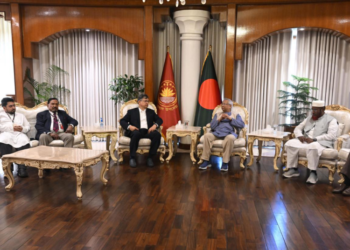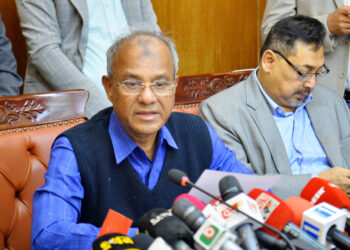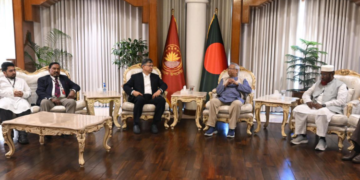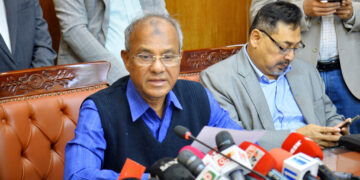India has suddenly cancelled a transshipment agreement that allowed Bangladeshi goods to pass through Indian territory to reach other countries. This decision, made on Wednesday, has caused concern among some businesspeople in Bangladesh. However, the government is saying there’s no need to panic.
Bangladesh’s Trade Adviser, Sheikh Bashiruddin, spoke to journalists at the Secretariat on Thursday and shared details about the situation, what it means for the country, and how Bangladesh plans to respond.
What is transshipment and why is it important?
Transshipment is a mechanism in which items are moved from one country to another before arriving at a third. Bangladesh used Indian roads and ports in this occasion to transport products to Nepal and Bhutan.
According to an order issued by India’s Central Board of Indirect Taxes and Customs, this was first approved in June 2020. It helped Bangladesh to reduce shipping times and expenses.
However, on Tuesday, CBIC cancelled that order without notice. This sudden cancellation has sparked questions and concerns, particularly among exporters who rely on this route.
Read more: Bangladesh Central bank cancels ICB Islamic bank board
No Major Problem for Bangladesh
Despite the cancellation, Sheikh Bashiruddin explained that Bangladesh would not face any major issues. The government is already working on improving its internal systems to handle the situation. He mentioned, “We are increasing our capacity to ensure that there are no shortages in trade. We are focusing on strengthening our commercial abilities.”
Meetings with Businesspeople and Buyers
The Trade Adviser also shared that a meeting was held on Wednesday with leaders from various business sectors, including buyers. They discussed the possible impacts of India’s decision and how Bangladesh can move forward.
“We spoke to businesspeople and buyers. Everyone agreed that we should try to handle this issue ourselves. We want to ensure that trade continues without interruption,” he said.
Focus on Infrastructure and Cost Management
When asked what steps the government would take, Sheikh Bashiruddin said, “We are working on two main things — infrastructure development and managing costs. Some costs may increase, and some changes will need to be made, but we are confident we will get through this.”
He also mentioned that Bangladesh is working on improving its road and port facilities to reduce its dependency on other countries in the future.
Will Bangladesh Take Any Counteraction?
On social media, some people have suggested that Bangladesh should cancel Indian access to transit facilities in return. When asked about this, Sheikh Bashiruddin said, “That’s not my area. My job is to focus on increasing Bangladesh’s capacity, not on taking revenge.”
His statement shows that the government is more focused on development than on political or emotional reactions.
Any Diplomatic Move or Letter to India?
The Trade Adviser said there are no plans right now to send a formal letter or complaint to India regarding the cancellation. “At the moment, we are not considering sending a letter. We are focusing on solutions,” he added.
Read more: How Bangladesh Honors Its Foreign Legends
Temporary Relief from the United States
In a bit of positive news, Sheikh Bashiruddin also shared that the United States has postponed its plan to add extra tariffs on Bangladeshi products for three months. “This gives us some time to strengthen our trade system and prepare better. It’s a relief for now,” he said.
He believes this temporary pause in tariffs from the U.S. will allow Bangladesh to make internal improvements and reduce trade imbalances.
Conclusion: A Challenge but also an Opportunity.
India’s withdrawal of the transshipment agreement presents a clear problem for Bangladesh, particularly for exporters who used that channel to sell goods to other nations. However, the government is not in a panic. Instead, it sees this as a chance to increase self-reliance.
Bangladesh’s Trade Adviser, Sheikh Bashiruddin, emphasised that the country will focus on developing its own strengths. Bangladesh wants to emerge from this scenario stronger, thanks to careful preparation, infrastructure improvements, and international partner help.
Source: Daily Jugantor
Share via:


















